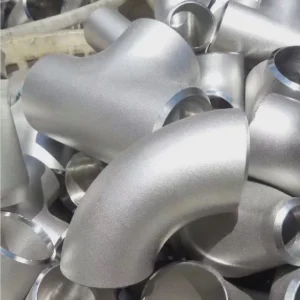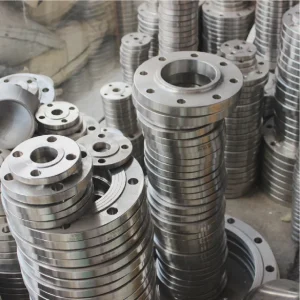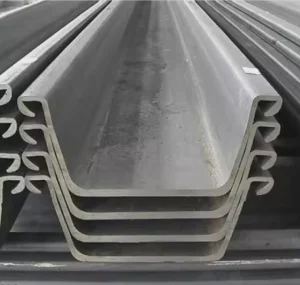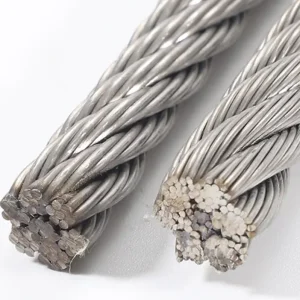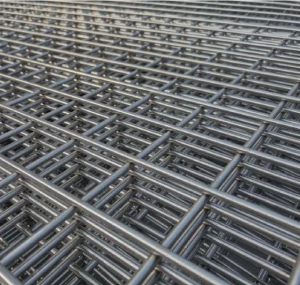For most industrial piping work in 2025, 316 stainless-steel flanges made to ASME B16.5 remain the standard choice for corrosion resistance and good mechanical performance at modest temperatures. Dimension coverage runs from NPS ½ through NPS 24 in common ANSI classes (150–2500 when applicable to size), and unit prices in 2025 vary dramatically by origin, quantity, flange type and certification — factory prices from China for small flanges can be in the single-digit U.S. dollar range, while stocked distributor units in the U.S. or Europe frequently list from tens to several hundreds of dollars per piece.
1) What is “316” and why it matters
“316” (and 316L) are austenitic stainless grades with molybdenum added for improved resistance against chlorides and pitting. For flanges used in chemical, food, marine, and many process applications, 316 / 316L is chosen when greater corrosion resistance than 304 is required. Buyers should confirm whether 316 (higher carbon) or 316L (low carbon) is required — low-carbon 316L avoids sensitization after welding and is the typical choice for welded flanges and welded systems.
2) Standards, flange types and face styles
Common technical points to know when ordering flanges:
-
Dimension standard: ASME B16.5 defines dimensions and pressure classes for pipe flanges and flanged fittings from NPS ½ through NPS 24 (metric and inch tables). Buyers making pressure- and interchange-critical purchases should reference the latest B16.5 edition.
-
Material standard: Forged stainless-steel flanges are commonly produced to specifications referencing ASTM A182 (for forgings and material grades such as F316 / F316L). Requesting A182 material and mill certificates is standard for critical projects.
-
Common types: Weld-neck (high-hub), slip-on, socket-weld, threaded (NPT), lap-joint, blind, ring-type joint (RTJ). Each type has pros/cons (weld-neck for high pressure/temperature, slip-on for lower-cost small-bore jobs).
-
Face options: Raised face (RF), flat face (FF), ring joint (RTJ), ring-type joints for high pressure. Select face type to match gasket and bolting choices.
3) Size coverage, pressure classes and quick dimension notes
-
Nominal sizes (NPS): ½" through 24" are covered by ASME B16.5 for the typical flange classes (150–2500 depending on size). Larger diameters fall under other standards (ASME B16.47, etc.).
-
Pressure classes: 150, 300, 400, 600, 900, 1500 and 2500 (not every class available for every nominal size). Pressure/temperature ratings depend on material and class — consult the B16 tables for the exact allowable working pressure at a given temperature.
-
Interchangeability: ASME/ANSI flanges follow standardized bolt circles, bolt-hole sizes and thicknesses so mating between certified ASME flanges is generally possible when class and size match. Non-ASME standards (PN / DIN / JIS) may not be interchangeable without adaptation.
4) Weight and how that affects cost
Flange weight scales rapidly with diameter and class (hub thickness and bolt circle). Heavier forged weld-neck or blind flanges used for large sizes translate directly into higher raw-material and machining costs. Manufacturers and engineers commonly use ANSI/ASME weight charts to estimate material consumption and lifting requirements. See flange weight charts for exact per-size weights during purchasing and transport planning.
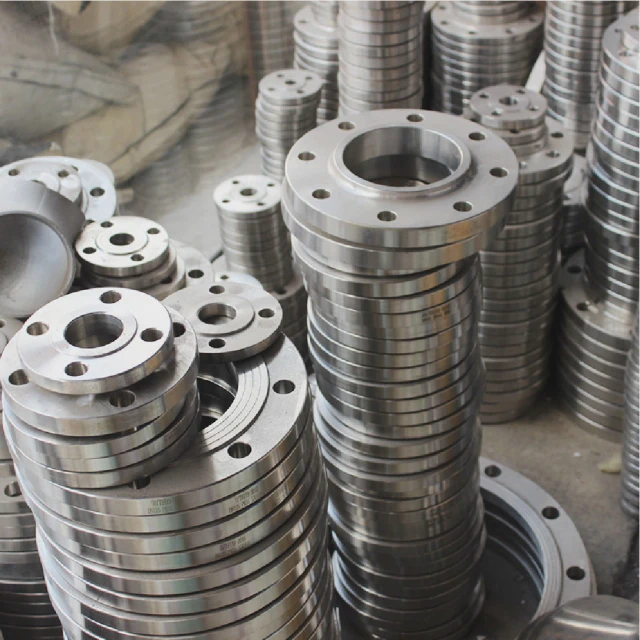
5) Price snapshot — global comparison (sample sizes, 2025)
The table below illustrates realistic range examples for commonly ordered flange sizes and types in 2025. These are representative market observations (factory FOB from Chinese mills versus stocked distributor prices in western markets). Price bands are for typical stock manufactured items (316 / 316L, RF, standard finish). Actual quotes will depend on certification, batch size, testing and logistics.
| Sample flange (material = 316/316L) | China — factory FOB (typical, small qty) | India — manufacturer (typical) | USA — stocked distributor (retail) | Europe — stocked distributor |
|---|---|---|---|---|
| 1" Class 150 Threaded / Slip-On | US$1 – US$12 / pc (small sizes often factory <$10) | US$3 – US$20 / pc (depends on maker). | US$40 – US$140 / pc (stocked; small order, quick ship) | US$50 – US$160 / pc (stock keeping distributors). |
| 4" Class 150 Slip-On | US$6 – US$35 / pc (forge + machining) | US$10 – US$45 / pc | US$90 – US$260 / pc (retail/stock). | US$100 – US$280 / pc |
| 8" Class 150 Blind or Weld-Neck | US$35 – US$140 / pc | US$50 – US$180 / pc | US$350 – US$1,200 / pc (stocked, certified, traceable). | US$380 – US$1,300 / pc |
Notes and sources: Chinese factory listings and trading-platform catalogues commonly show single-digit to low-double-digit USD pricing for smaller flanges when ordered direct from manufacturer with basic finish and MOQ; western distributors list stocked items at a substantial premium reflecting stocking, inspection, certification, warranty and smaller order quantities.
Raw material driver: stainless-steel plate/coil prices in 2025 materially influence flange cost. Public market bulletins in 2025 indicate 316L hot-rolled plate FOB China near ~US$3,400/MT (example market report), which places a floor under forge/machining costs for thick/higher-mass flanges.
6) What drives the large price spread?
A buyer will see very different quotes depending on:
-
Material grade and certification: 316 vs 316L vs 316H; specifying ASTM A182 material certificates, PMI (positive material identification) or traceable mill certs raises cost.
-
Flange type and class: Blind and weld-neck flanges use more material and machining than slip-on or threaded types. Higher class (300, 600) needs thicker hubs, heavier bolt circles.
-
Manufacturing route: Forged + finish-machined flanges cost more than plate-cut weld necks or pressed lap joints. Heat-treatment, machining tolerances, and surface finish (pickling, passivation) add cost.
-
Testing and QA: Radiographic (RT), ultrasonic (UT), PMI, hardness testing, and third-party inspection increase the price. Projects with third-party inspection almost always attract higher per-piece charges.
-
Quantity and logistics: Bulk orders reduce per-piece price; single-piece fast delivery from a stocked distributor costs considerably more. Freight, duties and lead time also matter.
-
Raw material price trends: plate/coil price movements (market volatility) appear quickly in forged part pricing.
7) Buying checklist — what to specify (minimize ambiguity)
When requesting quotes, include:
-
Material grade and spec: e.g., ASTM A182 F316L (request mill certs, PMI).
-
Standard / dimension reference: ASME B16.5 (edition/year) or PN/DIN with exact table.
-
Flange type & face finish: weld-neck / slip-on / blind / RTJ; RF / FF / RTJ.
-
Pressure class: 150, 300, etc. (match piping system class).
-
Heat treatment / testing: specify if UT/RT, hardness, threaded fit class, NDE, or 3rd-party inspection is required.
-
Quantity, delivery term (FOB/CIF/DDP), packing standard and target delivery date.
-
Specials: counterbore, flange painting, gasket ring grooves, tapped holes — note that custom machining attracts added cost and lead time.
Clear, complete POs cut down on misunderstandings and surprise charges.
8) Why select a factory-direct supplier — the Luokaiwei option
For procurement teams aiming to lower procurement cost while keeping control of specification and test evidence, purchasing direct from a capable Chinese manufacturer often gives the best value for standard flange lines:
-
Cost advantage: Luokaiwei offers factory-direct pricing and can undercut middle-market stocking distributors because there is no distributor markup. Example catalog listings from Chinese mills show single-digit USD prices for very small flanges in 2025; such pricing is possible only with factory sourcing and MOQ negotiation.
-
Customization: Luokaiwei supports custom diameters, special materials, special machining and matched flange sets, plus optional third-party inspection where required by international projects.
-
Traceability & certificates: we can supply ASTM A182 mill test reports, positive material ID, heat-number traceability and dimensional reports on request (for engineered projects).
-
Fast stock delivery: for stocked items Luokaiwei keeps selected sizes in ready inventory to provide rapid shipping of common flanges. For bespoke items, consolidated production scheduling reduces lead time compared with multiple small western suppliers.
-
Global logistics: we ship FOB / CIF and can assist with DDP and bonded-warehouse solutions to simplify import.
If you need a budget comparison, Luokaiwei can produce a side-by-side quote showing factory FOB cost, inspection fees and expected landed cost for your destination port so total landed pricing is transparent.
9) Practical procurement examples and tip-table
-
If price is the single criterion: order larger quantities from a qualified factory, accept basic finish and agree to standard testing (mill test report). Minimum cost per piece drops quickly with volume.
-
If traceability is critical (oil & gas, pharmaceuticals): demand ASTM A182 material certificates, NDE & third-party inspection; accept higher cost but lower project risk.
-
If time is essential: stocked western distributors deliver fastest but are most expensive per piece. Example: a stocked 1" 150# slip-on in U.S. listing shows triple to ten-times the factory FOB.
10) FAQs
Q1 — Is 316L always better than 316 for flanges?
Short: For welded systems and where intergranular corrosion is a concern, 316L is preferred. If your application uses high-temperature service above certain degrees or requires higher tensile strength, specify 316 or 316H where appropriate.
Q2 — Can I mate an ASME flange with a DIN/PN flange?
Short: No. ANS/ASME and PN/DIN bolt circles and thicknesses can differ; avoid mixing flange standards unless an adapter ring or custom machining is used.
Q3 — How much does testing (RT/UT/PMI) add to price?
Short: Testing can add 5–30% (small parts) to overall cost for inspection and handling; for large forged blind flanges it can be a higher percentage. Third-party witness inspection adds inspector/day expenses plus logistics.
Q4 — How to reduce landed cost without cutting QA?
Short: Increase order quantity (economy of scale), accept consolidated shipments, use FOB factory plus a trusted freight forwarder, and combine inspection requirements into batch runs to lower per-piece inspection costs.
Q5 — What documents to always require from a reputable supplier?
Short: Mill Test Report (MTR / EN 10204 3.1 or equivalent), dimensional inspection report, certificate of heat number traceability, PMI or chemical analysis on request, and packing list. For critical projects add NDE and third-party inspection clause.
Final practical notes
-
Ask for sample parts or small trial orders before scaling procurement.
-
If a quoted price looks too low relative to market plate prices and local stocked prices, validate MTRs and check delivery terms: hidden costs often appear in poor packing, missing certificates, or unexpected machining differences.
Contact Luokaiwei
Luokaiwei is a China-based manufacturer and exporter of stainless-steel flanges with factory production lines for 316 / 316L forged and machined flanges. We provide complete traceability, custom machining, and stock options with fast dispatch for common sizes. Request a detailed RFQ (preferred: include size, class, type, quantity, standards and destination port) and Luokaiwei will return a clear factory FOB quote with optional inspection plan.



